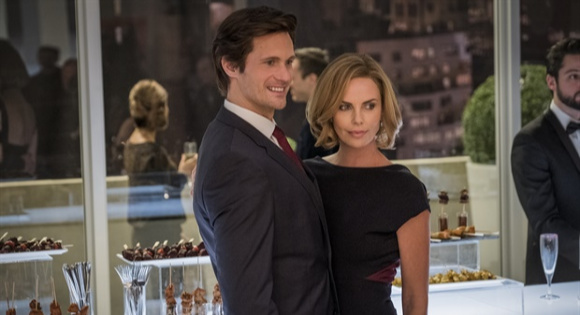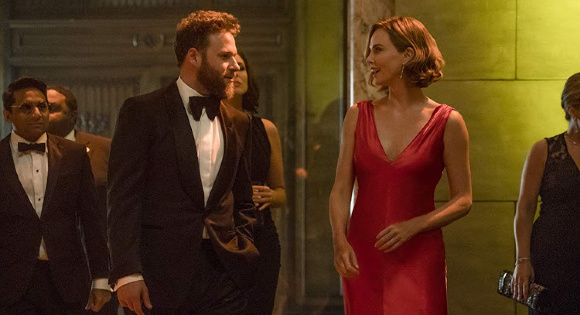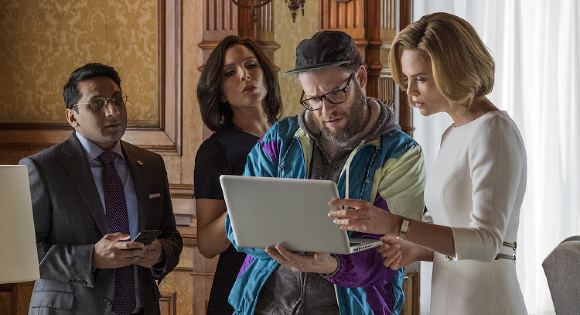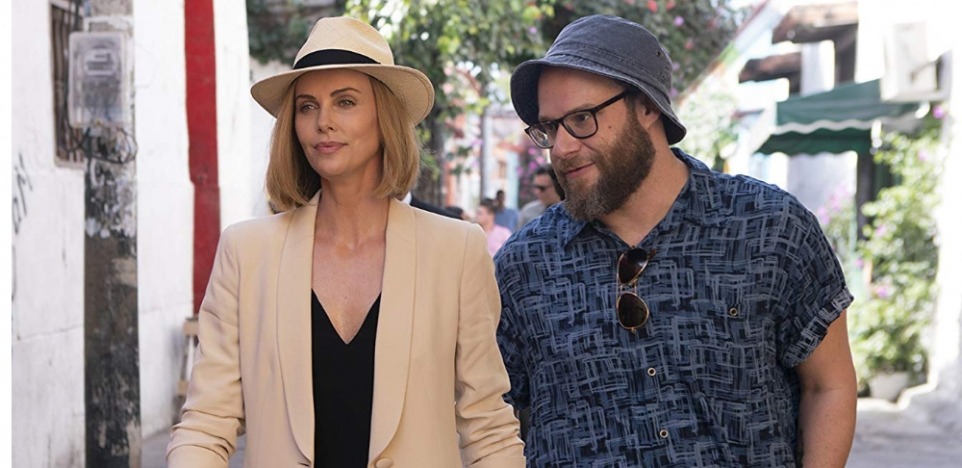In the opening scenes of this raucous romantic comedy, Fred Flarsky (Seth Rogen), a liberal journalist for a Brooklyn independent newspaper, is working undercover on a story about a neo-Nazi white supremacist group. Just as he is about to submit to getting a swastika tattoo, they discover his true identity. He escapes from their clutches only to learn shortly afterwards that a right-wing media baron and power-hungry slimeball (Andy Serkis) has purchased the publication he has given his energy and righteous indignation to for years. Fred promptly quits.

Meanwhile, Charlotte Field (Charlize Theron), the U.S. Secretary of State, is being given tips on how to ramp up her popularity with the public. Everybody admits that she is incredibly beautiful, but she ranks low on humor. She's also single and lonely. She's been known to flirt with the Canadian prime minister (Alexander Skarsgard) but both of them have been criticized for their awkward physical gestures — her weak arm-waves and his he-haw laugh.
When the President of the U.S. (Bob Odenkirk), a former TV star, tells Charlotte that he wants to go into movies and so will not seek re-election, she is happy to hear that he plans to endorse her. She heads off to a gala where Boy II Men are performing. Fred's best friend has taken him to the same event to cheer him up.

After Fred and Charlotte lock eyes across the crowded room and then meet, they recall that she used to babysit him 25 years ago. Later, she reads some of his writing and decides he's just what she needs to punch up her speeches with some humor. Her chief aide (June Diane Raphael) is convinced that this uncouth slob will be a problem for the campaign. Her fears are compounded when it's clear that Charlotte really likes Fred.
Director Jonathan Levine and screenplay writers Dan Sterling and Liz Hannah shift gears in the second-half of the film and move from political satire to romantic comedy. To impress the world with her commitments and clout, Charlotte and her team take off on a visit to 24 countries to gain signatures for a huge environmental treaty to rehabilitate the earth. Along the way, Fred convinces Charlotte that he can write better speeches if he knows her better, setting the stage for many private times together. Fred is mystified by her habit of "micro-napping" while standing up with her eyes open. She is moved when they see the magical Northern Lights in the sky and he cries for joy.

Long Shot makes some important points about what happens when traditional assumptions (the man is the powerful one; the woman serves him) are reversed. Fred wins Charlotte's love not by trying to control her but by listening to her stories. In turn, she is challenged to give up her idea that "Until you run the game, you have to play the game." Instead, the two of them change the rules of the game.
We only wish the film hadn't wasted a lot of time on a cliché-ridden sequence where the couple take a drug trip. But even that excursion can be set aside given the delightful performances showcasing good screen chemistry between Theron and Rogen.
Reflecting on Long Shot (after we stopped laughing; it is very funny), we thought of these quotes on some of its themes:
- "Men are taught to apologize for their weaknesses, women for their strengths."
— Lois Wyse - "When a man gets up to speak. people listen then look. When a woman gets up, people look, then, if they like what they see, they listen."
— Pauline Frederick - "One can never consent to creep when one feels an impulse to soar."
— Helen Keller
